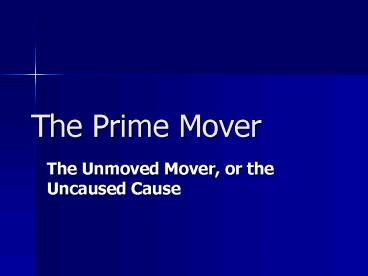The Prime Mover - PowerPoint PPT Presentation
1 / 11
Title:
The Prime Mover
Description:
In his book Metaphysics Aristotle calls this source of all movement the Prime Mover. ... everlasting life, and in Metaphysics Aristotle also calls this being ... – PowerPoint PPT presentation
Number of Views:1768
Avg rating:3.0/5.0
Title: The Prime Mover
1
The Prime Mover
- The Unmoved Mover, or the Uncaused Cause
2
- The uncaused cause is a philosophical concept
described by Aristotle as the first cause that
set the universe in motion. - In his book Metaphysics Aristotle calls this
source of all movement the Prime Mover. - It is a being with everlasting life, and in
Metaphysics Aristotle also calls this being God.
3
- Aristotle believed all movement depends on there
being a mover. - Movement melting, cooling, darkening, motion
etc.
4
B
C
A
5
- Aristotle argued the chain must eventually lead
to something which moves but itself must be
unmoved or motionless. This is the unmoved
mover, or Prime Mover. - The Prime Mover causes the movement of other
things, not as an efficient cause, but as a final
cause. - It is the purpose/ the end/ the teleology of the
movement, but does not move itself.
6
- The idea of this final cause is vital to the
theory, as an efficient cause will itself be
affected by pushing. - This is equal to Isaac Newtons Third Law of
Motion. (action and reaction are equal and
opposite) - Aristotle was keen to establish that the Prime
Mover is itself Unmoved, or unaffected, otherwise
the whole concept would break down.
7
- The Prime Mover must therefore draw things
towards itself, whilst remaining unmoved it is
the object of everything, it causes movement. - However Aristotle describes it as the object of
desire and love.
8
- Aristotle moves from a seemingly logical theory
to his own concept of God.
9
- The heavenly spheres (planets) in Aristotles
understanding of Astronomy, desire to imitate
God in their spirituality but as they cannot do
this, they do the best they can by moving in
eternal circles. - They all moved by their own unmoved movers, the
number of which Aristotle is either 55 or 47.
10
- Aristotle believes that God cannot think about
anything that will change him in anyway because
nothing can affect him, make him react or even
change him from not knowing to knowing. - Therefore Aristotle concludes that God thinks
about himself only, because he only knows
himself. - He does not know this physical world we inhabit,
he does not have a plan for us and hes not
affected by us.
11
- Thanks

